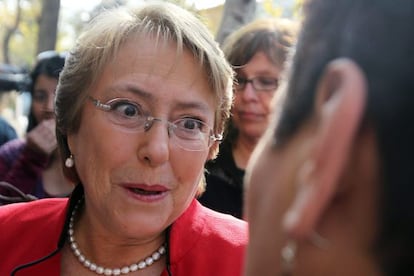Bachelet keeps Chileans guessing on turn to the left
One month away from presidential primaries, former leader giving nothing away on program


Since she returned to Chile on March 27, after 30 months at the United Nations in New York, former President Michelle Bachelet has had a busy schedule.
She announced her candidacy for re-election, set up her campaign headquarters in a remodeled home in an affluent Santiago neighborhood, named her election advisors, and has held meetings with citizens every Sunday in an effort to try to disassociate herself from the political parties, which have fallen out of favor with most Chileans.
Both the Chilean Socialists and the center-left Party for Democracy (PPD) have announced they will back Bachelet for a second term. But before the opposition’s June 30 primary, Bachelet will announce the major, far-reaching reforms she plans on introducing if she returns to La Moneda presidential palace, as most polls predict she will.
On the day after she returned, Bachelet, a physician by trade, gave a diagnosis of the country’s problems — including growing inequality and a poor education system — which have been snowballing since she left office in 2010. The former director of UN Women has already begun to appoint her advisors in different areas, including tax and constitutional experts, which will help her draft a soon-to-be-announced platform. “She has only appointed the offices and the rest is still on hold,” said one of her advisors privately.
But there is a discreet debate within the team as to how radical the reforms will be. Some believe that they are going to have a big impact — even among members of Concertación, the center-left coalition of parties that swept Bachelet into power in 2006. Privately, other advisors believe that discussions concerning liberal measures that were implemented during her first government — including gay rights and the legalization of marijuana — won’t continue after the primaries.
The constitutional issue will be resolved by hook or by crook"
The tension among her own campaign team surfaced during an episode in late April when a dispute erupted among the center-left over whether to convene a constituent assembly to change the 1980 Constitution that was drafted by the dictator Augusto Pinochet. The proposal, which had the support of the student movement, seduced part of the coalition while at the same time repulsing others. A few weeks ago, one of the campaign advisors, Fernando Atria, said that “the constitutional issue will be resolved by hook or by crook.” His statements bothered one of the group’s coordinators, Francisco Zúñiga, as well as other members of the Chilean center-left faction, which is comprised mainly of Christian Democrats. A sector within the coalition believes that this mechanism will end up concentrating power around a populist leader, as has occurred in Venezuela.
Meanwhile, Bachelet has asked candidates for deputy and senate seats to run in a primary — a request that has caused bad blood between her and some of her closest allies. The former president explained that she wanted to take advantage of the new electoral law and allow voters to select their own candidates.
Coalition members could not come to an agreement, and the May 1 deadline for inscriptions to run in the primaries passed without the dispute being settled. The entire affair became an embarrassing one for Bachelet, as some observers commented that she was unable to control members of her own coalition.
But how far will Bachelet go to appease the left?
“Bachelet is not the same woman who arrived at La Moneda in 2006 or when she left Chile in September 2012 to head up UN Women,” said one advisor. “She now enjoys total autonomy, which enables her to draft and dictate public policy.”
Tu suscripción se está usando en otro dispositivo
¿Quieres añadir otro usuario a tu suscripción?
Si continúas leyendo en este dispositivo, no se podrá leer en el otro.
FlechaTu suscripción se está usando en otro dispositivo y solo puedes acceder a EL PAÍS desde un dispositivo a la vez.
Si quieres compartir tu cuenta, cambia tu suscripción a la modalidad Premium, así podrás añadir otro usuario. Cada uno accederá con su propia cuenta de email, lo que os permitirá personalizar vuestra experiencia en EL PAÍS.
¿Tienes una suscripción de empresa? Accede aquí para contratar más cuentas.
En el caso de no saber quién está usando tu cuenta, te recomendamos cambiar tu contraseña aquí.
Si decides continuar compartiendo tu cuenta, este mensaje se mostrará en tu dispositivo y en el de la otra persona que está usando tu cuenta de forma indefinida, afectando a tu experiencia de lectura. Puedes consultar aquí los términos y condiciones de la suscripción digital.








































